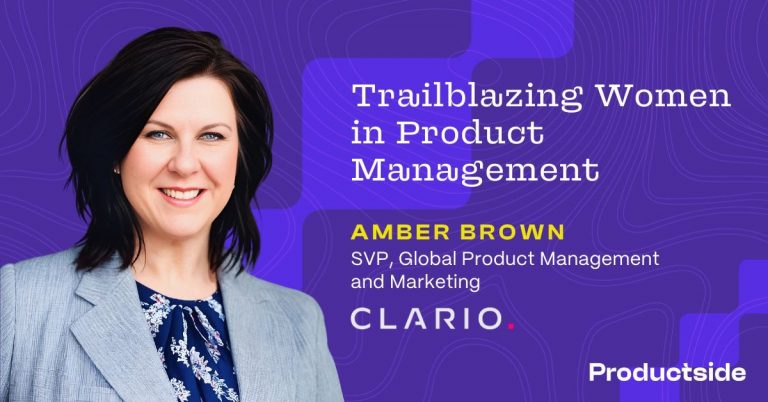For our next installment of the Women in Product Management Series I interviewed Brooke Huling, Chief Product Officer at Aceable. To read the entire series on Women in Product
How did you get into product management?
I started as an accountant and quickly realized that was not my cup of tea. I fell into a software company fixing accounting databases, fortunate to be surrounded by some amazing technical leaders who saw something in me. I was recruited into testing and then into Product Management—and I fell in love! The lady running that team knew her stuff. She had a magnetic personality and customers loved her. She pulled me in and said, “I want you to do this.” She taught me the foundation of Product Management, and she is a lifelong friend to this day — I owe it all to her.
Any missteps along the way?
A big misstep was when I went from Product Manager to Product Leader, I underestimated how much effort needed to go into that transition. I remember thinking, “I’m a manager. This is the next step on my career timeline. I’m checking the box.” I did not understand how different it would be.
Leading Product Managers is a complicated task, because it’s one of the most type A professions. Product Managers know what they’re doing, and they want to go build strategy and roadmaps. Leading that kind of team takes an extra dose of leadership skills— it’s important to be authentic and transparent, and give them proper coaching and care. My misstep was underestimating that. But missteps are for the better: if we recognize how mistakes influence and impact us moving forward, we can grow. As Agile has taught us, we can iterate on those mistakes and have a postmortem when things go wrong. It took several years and someone willing to give me the “gift” of feedback, but eventually, I put the necessary tools into my leadership toolbelt. I accelerated my career track and helped others, too. The best part now is watching others progress.
What do you find most interesting about Product Management?
No two days are the same. You could be dealing with people issues one day, (especially within leadership roles), strategy the next, profit and revenue the next, a demo day at the end of the week, and a scrum ceremony the week after. It never gets boring, and I can always expand things with research, or looking at the competition, or ask the team to kick off a side project. I get to make it my own. And I see the impact we have on the customers and the company. It’s rewarding when you fall in love with the space, the market, and the problems, and then build the solutions. There’s nothing better.
What do you find the most challenging?
Saying no. Everyone wants something from you. Sales teams want features and competitive roadmaps. Customers want to solve their issues with the software. Executives want profit and revenue. Everybody wants it right now. No matter how big your company is, you will never be able to do everything. You will always have to say no to someone or something. You must build in trust and transparency, so when you say no, they understand why. They see that it is a data–driven decision, and there is priority behind it. You’re not saying no to be mean or because you don’t like the team. That truly is the hardest part. Someone is always disappointed, and you have to help them be okay with that.
What are you looking for when you’re hiring Product Managers for your team?
I’m looking for people with drive, grit, excellent communication skills, the desire to build strong relationships, and tenacity to get through hard days. This job isn’t easy. I’ve had defects, outages, security breaches — you see it all. I’m looking for someone with a track record for growth you can see on their resume. They have a vision for their future. My favorite question is, “What do you want to be when you grow up?” People who don’t know how to answer that , are probably not a good fit. I like people who say, “I want your job and then I want the one after that.” That’s who I hired, because they have passion and grit, and they can see themselves in that role. It’s also important to find a good cultural fit with your team. At Aceable, we have a family, and when I look for that next person, especially within my leadership team, I’m looking for a new member of the family who’s going to come in, be curious, bring new strengths to the table, support their peers, learn, and not throw elbows.
What advice would you give women going into product management?
We need more authentic, compassionate, smart women in this profession. We are building the roadmaps and features of products used every day around the world—from your online real estate website to your car. Even your refrigerator and doorbell have software. If the experience is completely driven by a non-diverse team, it will be tailored through a narrow mindset, and that is the opposite of what we need. Given that the world is running on software, we need more women in this field. For leaders, it’s our job to hold the ladder, to find those women and convince them. I’ve had amazing female Product Managers in my organization who I have personally invited to apply for a Product Manager or team lead role. I would love to see more women take a risk, trust themselves, and dive in. It’s a lot of work, but it’s extremely rewarding. They won’t regret it.
Any guiding principle?
We’re not robots, we are humans, craving connection and purpose. Give people space and grace, and trust they’re coming from a good place, even if you don’t agree with their approach. I treat everyone that way, and I work really hard with my organization to make sure every single person knows they’re valued. I see them. I know they’re human with thoughts and feelings. My guiding principles are making sure that everyone feels connected, like they’re part of a bigger purpose. When we have that, and they’re willing to put in the effort because they understand their efforts matter, we can do anything. I’m also a big fan of “perfection is the enemy of good enough.” Within this profession, it’s easy to get caught up in the hunt for perfection. If you do that, you’ll never solve a customer’s problem or beat the competition, but you’ll burn out trying. It’s about early, incremental improvements and staying close to your customers and their problems, so that you can innovate along the way.


